Business Law Essay: Electronic Contracts and Consumer Law Analysis
VerifiedAdded on 2023/01/16
|13
|3332
|30
Essay
AI Summary
This essay delves into the realm of business law, examining the essential elements of electronic contracts and the relevant legislations governing online commercial transactions, particularly within the Australian context. It outlines the key components necessary for a valid contract, including offer and acceptance, lawful consideration, and free consent, while also exploring the legislative framework that governs online businesses, such as the Corporations Act 2001 (Cth), the Competition and Consumer Act 2010 (Cth), and the Privacy Act 1988 (Cth). Furthermore, the essay analyzes several relevant court cases, including ACCC v Chen and Curtis v Singtel Optus Pty Ltd, to illustrate the practical application of these laws. The essay also provides a case study involving a consumer, Pepper, who purchased a photocopier, and analyzes his rights under the Australian Consumer Law, specifically focusing on issues of misrepresentation and the responsibilities of the seller. The analysis references key sections of the ACL, such as Section 29 and Section 236, to determine the liabilities of Office Express Ltd and its sales representative.
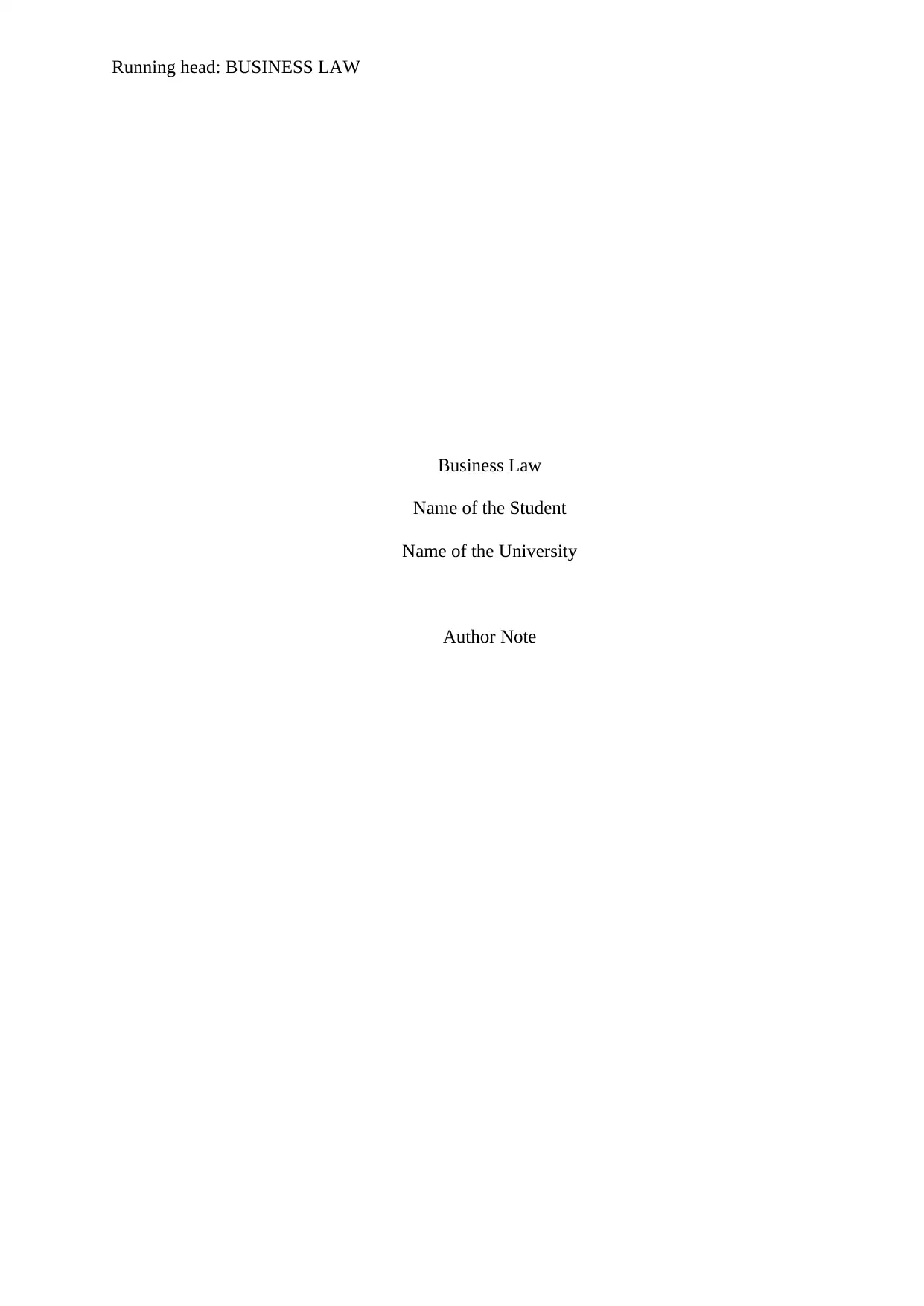
Running head: BUSINESS LAW
Business Law
Name of the Student
Name of the University
Author Note
Business Law
Name of the Student
Name of the University
Author Note
Paraphrase This Document
Need a fresh take? Get an instant paraphrase of this document with our AI Paraphraser
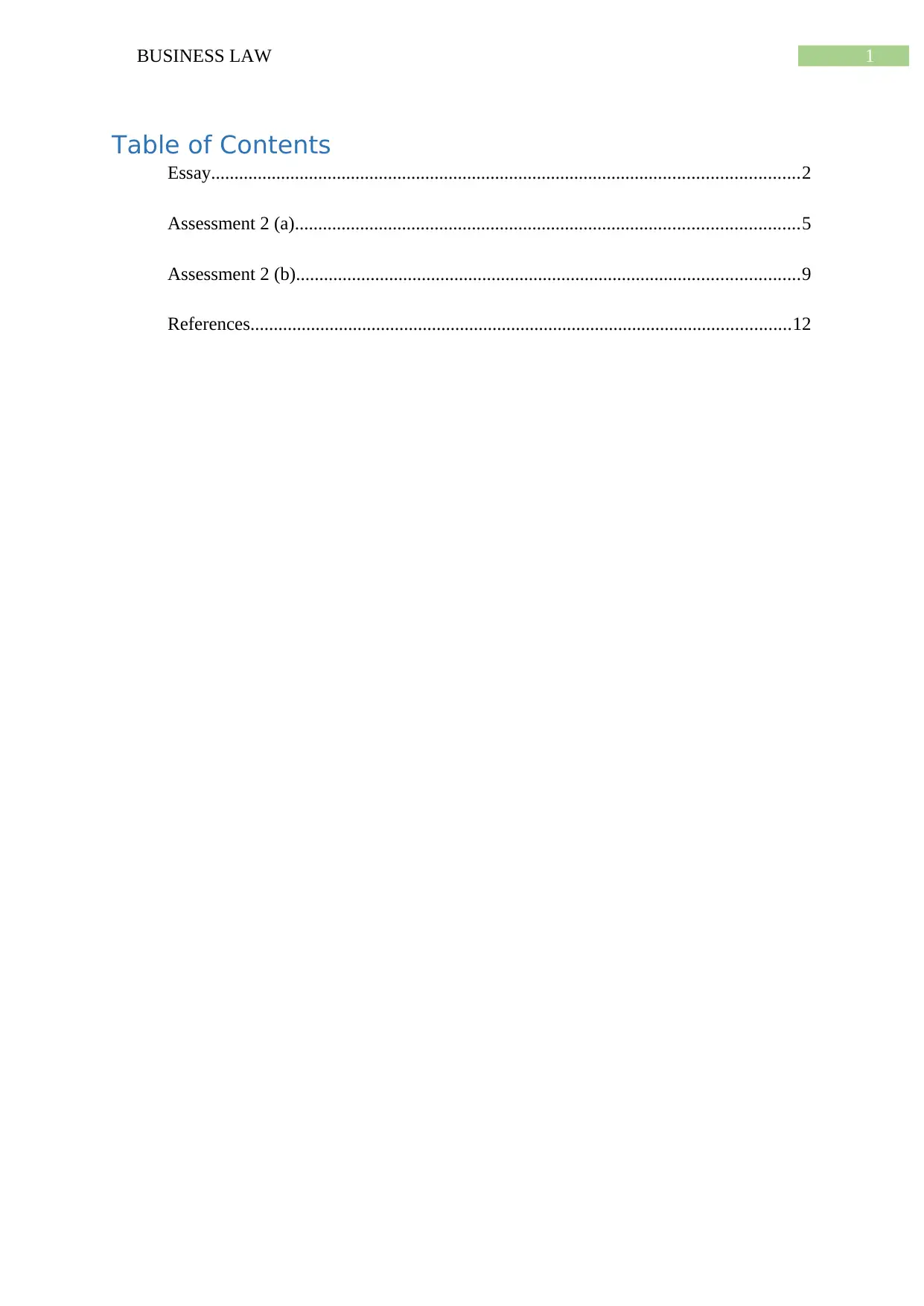
1BUSINESS LAW
Table of Contents
Essay..............................................................................................................................2
Assessment 2 (a)............................................................................................................5
Assessment 2 (b)............................................................................................................9
References....................................................................................................................12
Table of Contents
Essay..............................................................................................................................2
Assessment 2 (a)............................................................................................................5
Assessment 2 (b)............................................................................................................9
References....................................................................................................................12
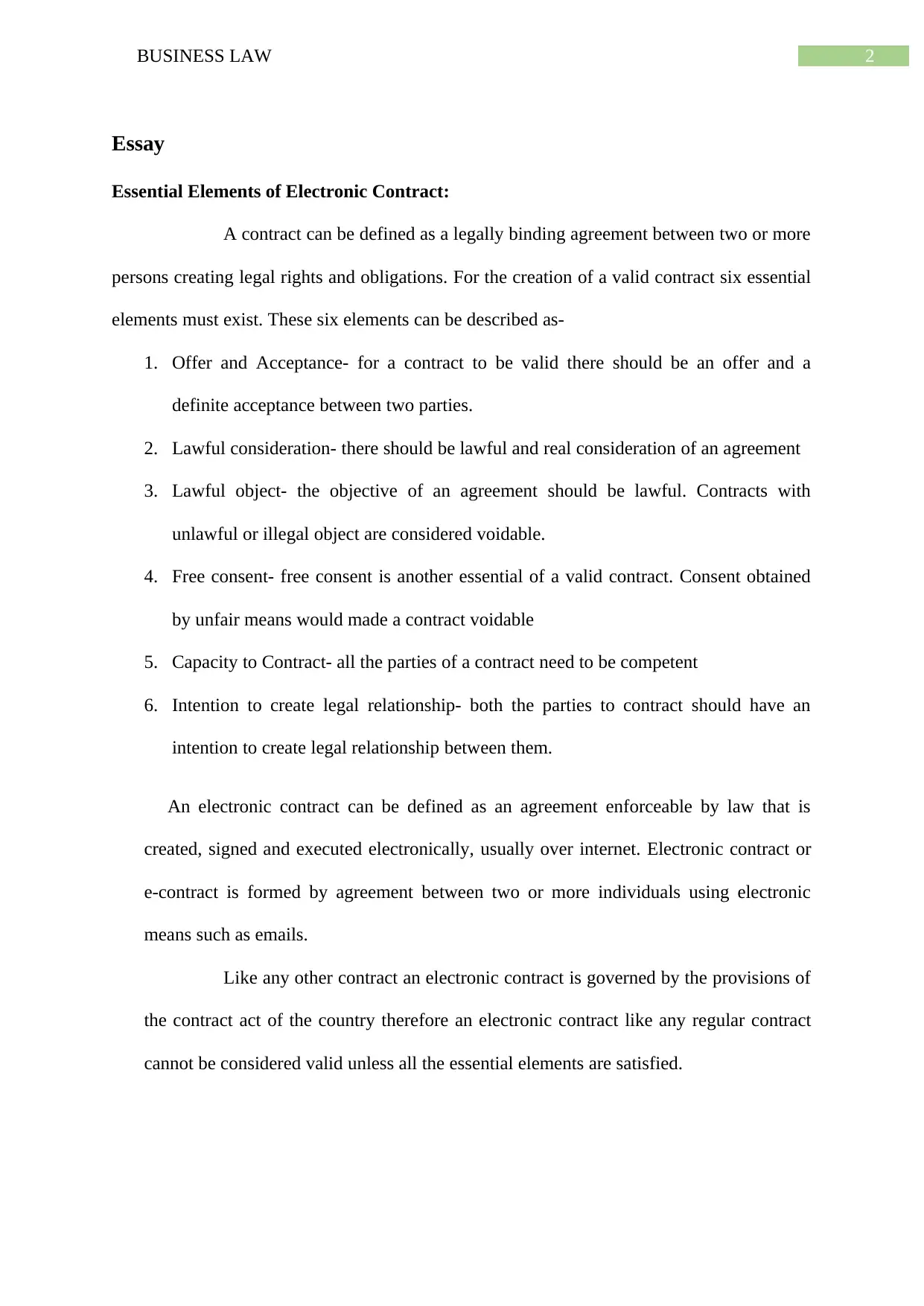
2BUSINESS LAW
Essay
Essential Elements of Electronic Contract:
A contract can be defined as a legally binding agreement between two or more
persons creating legal rights and obligations. For the creation of a valid contract six essential
elements must exist. These six elements can be described as-
1. Offer and Acceptance- for a contract to be valid there should be an offer and a
definite acceptance between two parties.
2. Lawful consideration- there should be lawful and real consideration of an agreement
3. Lawful object- the objective of an agreement should be lawful. Contracts with
unlawful or illegal object are considered voidable.
4. Free consent- free consent is another essential of a valid contract. Consent obtained
by unfair means would made a contract voidable
5. Capacity to Contract- all the parties of a contract need to be competent
6. Intention to create legal relationship- both the parties to contract should have an
intention to create legal relationship between them.
An electronic contract can be defined as an agreement enforceable by law that is
created, signed and executed electronically, usually over internet. Electronic contract or
e-contract is formed by agreement between two or more individuals using electronic
means such as emails.
Like any other contract an electronic contract is governed by the provisions of
the contract act of the country therefore an electronic contract like any regular contract
cannot be considered valid unless all the essential elements are satisfied.
Essay
Essential Elements of Electronic Contract:
A contract can be defined as a legally binding agreement between two or more
persons creating legal rights and obligations. For the creation of a valid contract six essential
elements must exist. These six elements can be described as-
1. Offer and Acceptance- for a contract to be valid there should be an offer and a
definite acceptance between two parties.
2. Lawful consideration- there should be lawful and real consideration of an agreement
3. Lawful object- the objective of an agreement should be lawful. Contracts with
unlawful or illegal object are considered voidable.
4. Free consent- free consent is another essential of a valid contract. Consent obtained
by unfair means would made a contract voidable
5. Capacity to Contract- all the parties of a contract need to be competent
6. Intention to create legal relationship- both the parties to contract should have an
intention to create legal relationship between them.
An electronic contract can be defined as an agreement enforceable by law that is
created, signed and executed electronically, usually over internet. Electronic contract or
e-contract is formed by agreement between two or more individuals using electronic
means such as emails.
Like any other contract an electronic contract is governed by the provisions of
the contract act of the country therefore an electronic contract like any regular contract
cannot be considered valid unless all the essential elements are satisfied.
⊘ This is a preview!⊘
Do you want full access?
Subscribe today to unlock all pages.

Trusted by 1+ million students worldwide
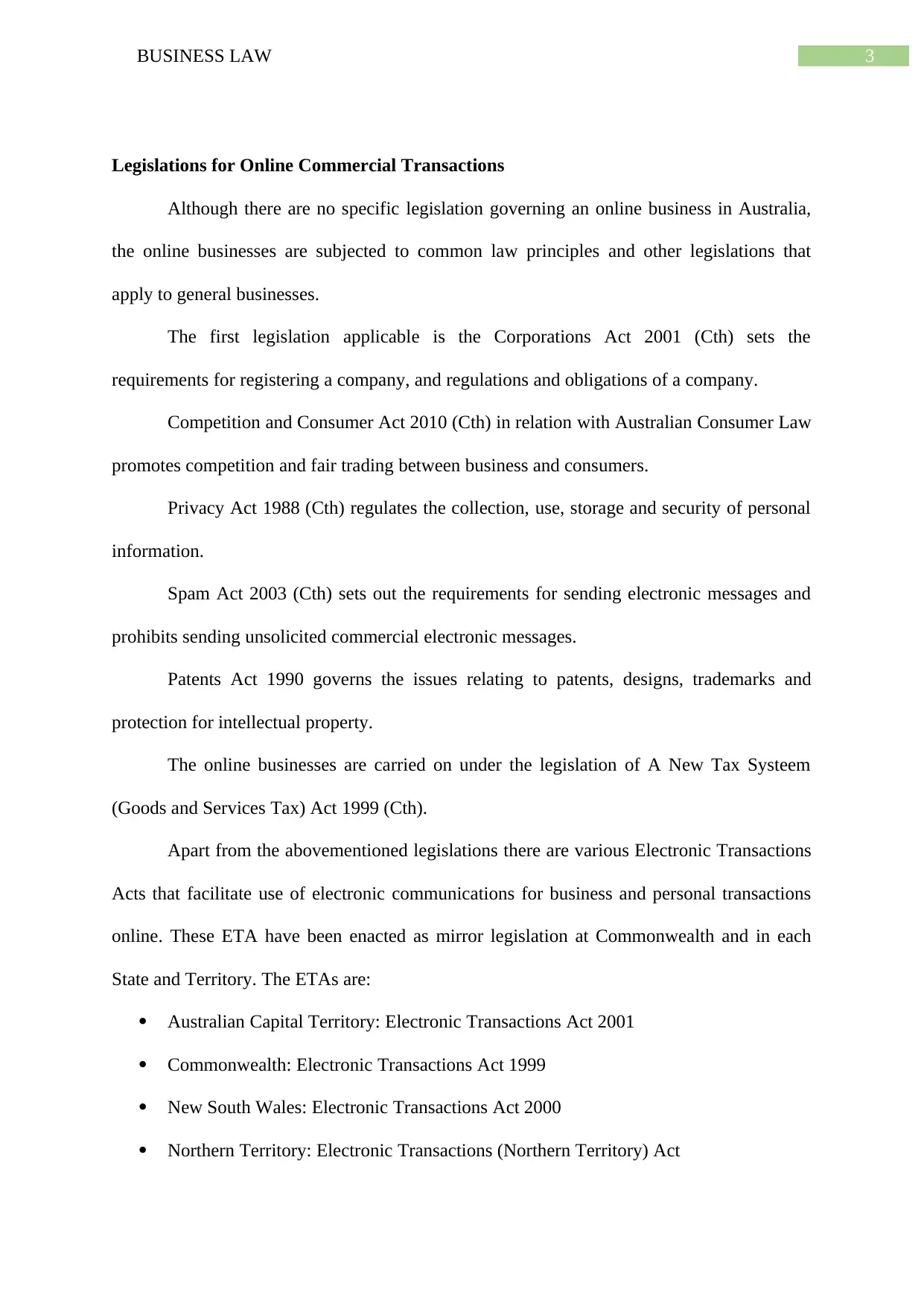
3BUSINESS LAW
Legislations for Online Commercial Transactions
Although there are no specific legislation governing an online business in Australia,
the online businesses are subjected to common law principles and other legislations that
apply to general businesses.
The first legislation applicable is the Corporations Act 2001 (Cth) sets the
requirements for registering a company, and regulations and obligations of a company.
Competition and Consumer Act 2010 (Cth) in relation with Australian Consumer Law
promotes competition and fair trading between business and consumers.
Privacy Act 1988 (Cth) regulates the collection, use, storage and security of personal
information.
Spam Act 2003 (Cth) sets out the requirements for sending electronic messages and
prohibits sending unsolicited commercial electronic messages.
Patents Act 1990 governs the issues relating to patents, designs, trademarks and
protection for intellectual property.
The online businesses are carried on under the legislation of A New Tax Systeem
(Goods and Services Tax) Act 1999 (Cth).
Apart from the abovementioned legislations there are various Electronic Transactions
Acts that facilitate use of electronic communications for business and personal transactions
online. These ETA have been enacted as mirror legislation at Commonwealth and in each
State and Territory. The ETAs are:
Australian Capital Territory: Electronic Transactions Act 2001
Commonwealth: Electronic Transactions Act 1999
New South Wales: Electronic Transactions Act 2000
Northern Territory: Electronic Transactions (Northern Territory) Act
Legislations for Online Commercial Transactions
Although there are no specific legislation governing an online business in Australia,
the online businesses are subjected to common law principles and other legislations that
apply to general businesses.
The first legislation applicable is the Corporations Act 2001 (Cth) sets the
requirements for registering a company, and regulations and obligations of a company.
Competition and Consumer Act 2010 (Cth) in relation with Australian Consumer Law
promotes competition and fair trading between business and consumers.
Privacy Act 1988 (Cth) regulates the collection, use, storage and security of personal
information.
Spam Act 2003 (Cth) sets out the requirements for sending electronic messages and
prohibits sending unsolicited commercial electronic messages.
Patents Act 1990 governs the issues relating to patents, designs, trademarks and
protection for intellectual property.
The online businesses are carried on under the legislation of A New Tax Systeem
(Goods and Services Tax) Act 1999 (Cth).
Apart from the abovementioned legislations there are various Electronic Transactions
Acts that facilitate use of electronic communications for business and personal transactions
online. These ETA have been enacted as mirror legislation at Commonwealth and in each
State and Territory. The ETAs are:
Australian Capital Territory: Electronic Transactions Act 2001
Commonwealth: Electronic Transactions Act 1999
New South Wales: Electronic Transactions Act 2000
Northern Territory: Electronic Transactions (Northern Territory) Act
Paraphrase This Document
Need a fresh take? Get an instant paraphrase of this document with our AI Paraphraser
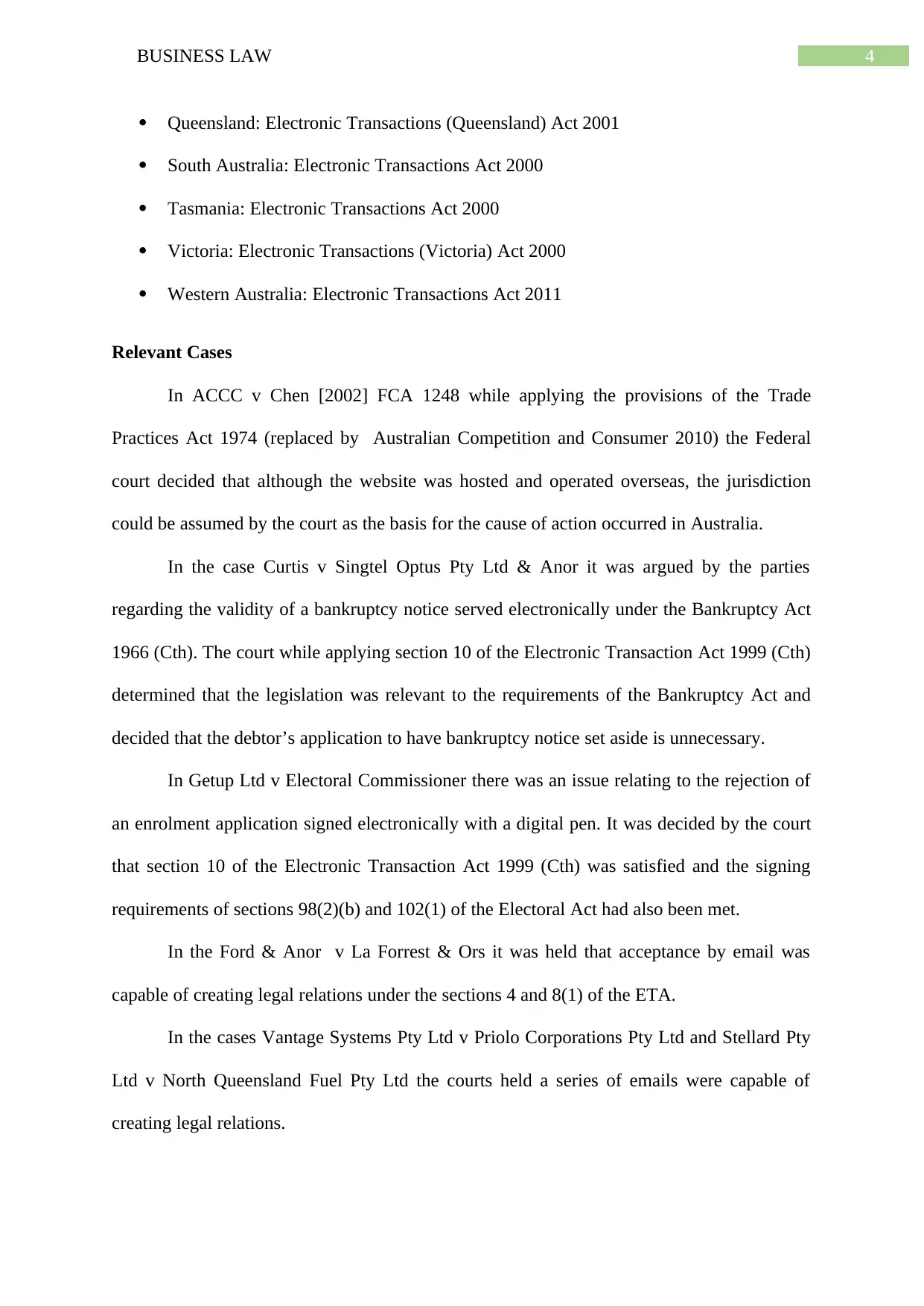
4BUSINESS LAW
Queensland: Electronic Transactions (Queensland) Act 2001
South Australia: Electronic Transactions Act 2000
Tasmania: Electronic Transactions Act 2000
Victoria: Electronic Transactions (Victoria) Act 2000
Western Australia: Electronic Transactions Act 2011
Relevant Cases
In ACCC v Chen [2002] FCA 1248 while applying the provisions of the Trade
Practices Act 1974 (replaced by Australian Competition and Consumer 2010) the Federal
court decided that although the website was hosted and operated overseas, the jurisdiction
could be assumed by the court as the basis for the cause of action occurred in Australia.
In the case Curtis v Singtel Optus Pty Ltd & Anor it was argued by the parties
regarding the validity of a bankruptcy notice served electronically under the Bankruptcy Act
1966 (Cth). The court while applying section 10 of the Electronic Transaction Act 1999 (Cth)
determined that the legislation was relevant to the requirements of the Bankruptcy Act and
decided that the debtor’s application to have bankruptcy notice set aside is unnecessary.
In Getup Ltd v Electoral Commissioner there was an issue relating to the rejection of
an enrolment application signed electronically with a digital pen. It was decided by the court
that section 10 of the Electronic Transaction Act 1999 (Cth) was satisfied and the signing
requirements of sections 98(2)(b) and 102(1) of the Electoral Act had also been met.
In the Ford & Anor v La Forrest & Ors it was held that acceptance by email was
capable of creating legal relations under the sections 4 and 8(1) of the ETA.
In the cases Vantage Systems Pty Ltd v Priolo Corporations Pty Ltd and Stellard Pty
Ltd v North Queensland Fuel Pty Ltd the courts held a series of emails were capable of
creating legal relations.
Queensland: Electronic Transactions (Queensland) Act 2001
South Australia: Electronic Transactions Act 2000
Tasmania: Electronic Transactions Act 2000
Victoria: Electronic Transactions (Victoria) Act 2000
Western Australia: Electronic Transactions Act 2011
Relevant Cases
In ACCC v Chen [2002] FCA 1248 while applying the provisions of the Trade
Practices Act 1974 (replaced by Australian Competition and Consumer 2010) the Federal
court decided that although the website was hosted and operated overseas, the jurisdiction
could be assumed by the court as the basis for the cause of action occurred in Australia.
In the case Curtis v Singtel Optus Pty Ltd & Anor it was argued by the parties
regarding the validity of a bankruptcy notice served electronically under the Bankruptcy Act
1966 (Cth). The court while applying section 10 of the Electronic Transaction Act 1999 (Cth)
determined that the legislation was relevant to the requirements of the Bankruptcy Act and
decided that the debtor’s application to have bankruptcy notice set aside is unnecessary.
In Getup Ltd v Electoral Commissioner there was an issue relating to the rejection of
an enrolment application signed electronically with a digital pen. It was decided by the court
that section 10 of the Electronic Transaction Act 1999 (Cth) was satisfied and the signing
requirements of sections 98(2)(b) and 102(1) of the Electoral Act had also been met.
In the Ford & Anor v La Forrest & Ors it was held that acceptance by email was
capable of creating legal relations under the sections 4 and 8(1) of the ETA.
In the cases Vantage Systems Pty Ltd v Priolo Corporations Pty Ltd and Stellard Pty
Ltd v North Queensland Fuel Pty Ltd the courts held a series of emails were capable of
creating legal relations.
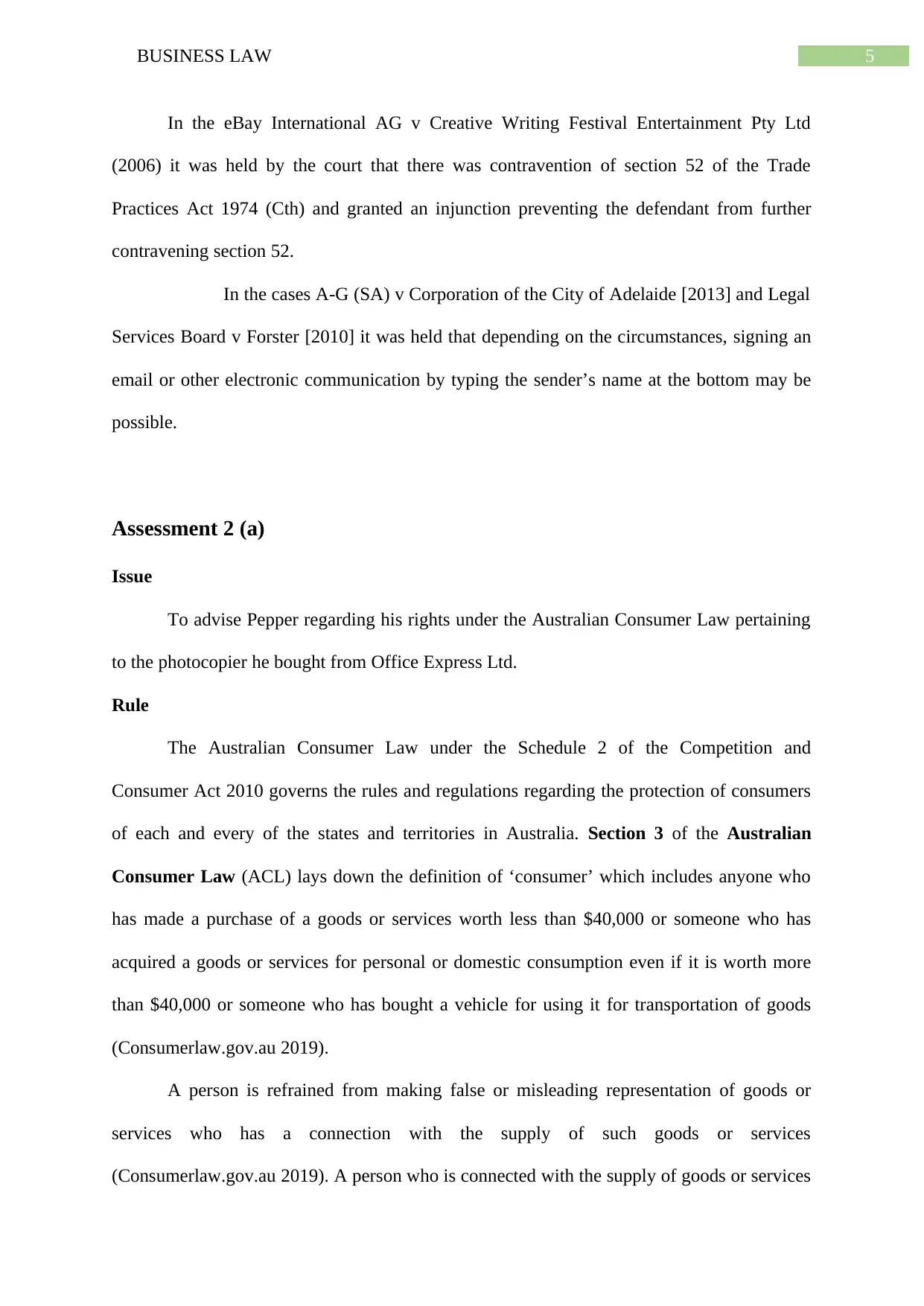
5BUSINESS LAW
In the eBay International AG v Creative Writing Festival Entertainment Pty Ltd
(2006) it was held by the court that there was contravention of section 52 of the Trade
Practices Act 1974 (Cth) and granted an injunction preventing the defendant from further
contravening section 52.
In the cases A-G (SA) v Corporation of the City of Adelaide [2013] and Legal
Services Board v Forster [2010] it was held that depending on the circumstances, signing an
email or other electronic communication by typing the sender’s name at the bottom may be
possible.
Assessment 2 (a)
Issue
To advise Pepper regarding his rights under the Australian Consumer Law pertaining
to the photocopier he bought from Office Express Ltd.
Rule
The Australian Consumer Law under the Schedule 2 of the Competition and
Consumer Act 2010 governs the rules and regulations regarding the protection of consumers
of each and every of the states and territories in Australia. Section 3 of the Australian
Consumer Law (ACL) lays down the definition of ‘consumer’ which includes anyone who
has made a purchase of a goods or services worth less than $40,000 or someone who has
acquired a goods or services for personal or domestic consumption even if it is worth more
than $40,000 or someone who has bought a vehicle for using it for transportation of goods
(Consumerlaw.gov.au 2019).
A person is refrained from making false or misleading representation of goods or
services who has a connection with the supply of such goods or services
(Consumerlaw.gov.au 2019). A person who is connected with the supply of goods or services
In the eBay International AG v Creative Writing Festival Entertainment Pty Ltd
(2006) it was held by the court that there was contravention of section 52 of the Trade
Practices Act 1974 (Cth) and granted an injunction preventing the defendant from further
contravening section 52.
In the cases A-G (SA) v Corporation of the City of Adelaide [2013] and Legal
Services Board v Forster [2010] it was held that depending on the circumstances, signing an
email or other electronic communication by typing the sender’s name at the bottom may be
possible.
Assessment 2 (a)
Issue
To advise Pepper regarding his rights under the Australian Consumer Law pertaining
to the photocopier he bought from Office Express Ltd.
Rule
The Australian Consumer Law under the Schedule 2 of the Competition and
Consumer Act 2010 governs the rules and regulations regarding the protection of consumers
of each and every of the states and territories in Australia. Section 3 of the Australian
Consumer Law (ACL) lays down the definition of ‘consumer’ which includes anyone who
has made a purchase of a goods or services worth less than $40,000 or someone who has
acquired a goods or services for personal or domestic consumption even if it is worth more
than $40,000 or someone who has bought a vehicle for using it for transportation of goods
(Consumerlaw.gov.au 2019).
A person is refrained from making false or misleading representation of goods or
services who has a connection with the supply of such goods or services
(Consumerlaw.gov.au 2019). A person who is connected with the supply of goods or services
⊘ This is a preview!⊘
Do you want full access?
Subscribe today to unlock all pages.

Trusted by 1+ million students worldwide
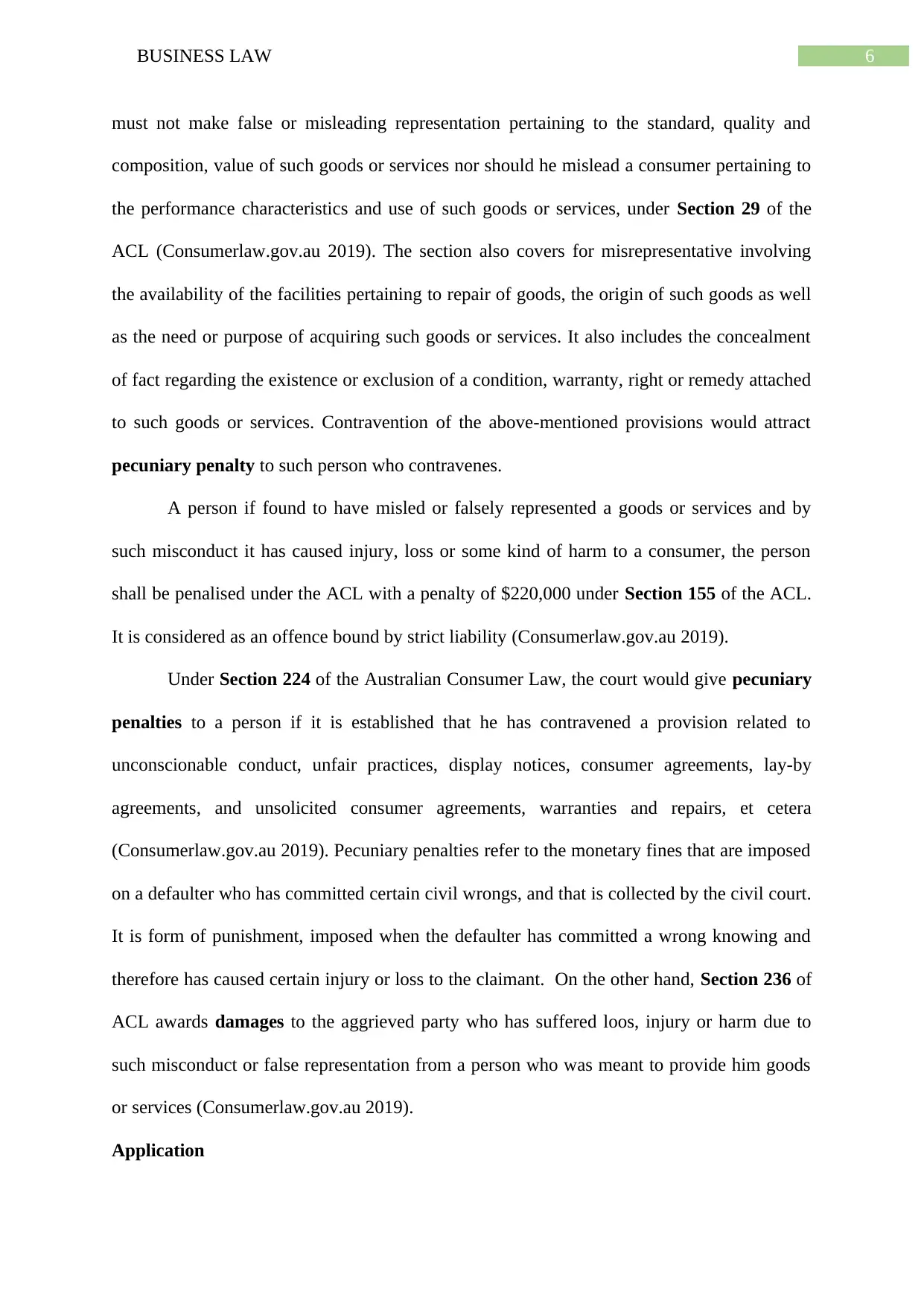
6BUSINESS LAW
must not make false or misleading representation pertaining to the standard, quality and
composition, value of such goods or services nor should he mislead a consumer pertaining to
the performance characteristics and use of such goods or services, under Section 29 of the
ACL (Consumerlaw.gov.au 2019). The section also covers for misrepresentative involving
the availability of the facilities pertaining to repair of goods, the origin of such goods as well
as the need or purpose of acquiring such goods or services. It also includes the concealment
of fact regarding the existence or exclusion of a condition, warranty, right or remedy attached
to such goods or services. Contravention of the above-mentioned provisions would attract
pecuniary penalty to such person who contravenes.
A person if found to have misled or falsely represented a goods or services and by
such misconduct it has caused injury, loss or some kind of harm to a consumer, the person
shall be penalised under the ACL with a penalty of $220,000 under Section 155 of the ACL.
It is considered as an offence bound by strict liability (Consumerlaw.gov.au 2019).
Under Section 224 of the Australian Consumer Law, the court would give pecuniary
penalties to a person if it is established that he has contravened a provision related to
unconscionable conduct, unfair practices, display notices, consumer agreements, lay-by
agreements, and unsolicited consumer agreements, warranties and repairs, et cetera
(Consumerlaw.gov.au 2019). Pecuniary penalties refer to the monetary fines that are imposed
on a defaulter who has committed certain civil wrongs, and that is collected by the civil court.
It is form of punishment, imposed when the defaulter has committed a wrong knowing and
therefore has caused certain injury or loss to the claimant. On the other hand, Section 236 of
ACL awards damages to the aggrieved party who has suffered loos, injury or harm due to
such misconduct or false representation from a person who was meant to provide him goods
or services (Consumerlaw.gov.au 2019).
Application
must not make false or misleading representation pertaining to the standard, quality and
composition, value of such goods or services nor should he mislead a consumer pertaining to
the performance characteristics and use of such goods or services, under Section 29 of the
ACL (Consumerlaw.gov.au 2019). The section also covers for misrepresentative involving
the availability of the facilities pertaining to repair of goods, the origin of such goods as well
as the need or purpose of acquiring such goods or services. It also includes the concealment
of fact regarding the existence or exclusion of a condition, warranty, right or remedy attached
to such goods or services. Contravention of the above-mentioned provisions would attract
pecuniary penalty to such person who contravenes.
A person if found to have misled or falsely represented a goods or services and by
such misconduct it has caused injury, loss or some kind of harm to a consumer, the person
shall be penalised under the ACL with a penalty of $220,000 under Section 155 of the ACL.
It is considered as an offence bound by strict liability (Consumerlaw.gov.au 2019).
Under Section 224 of the Australian Consumer Law, the court would give pecuniary
penalties to a person if it is established that he has contravened a provision related to
unconscionable conduct, unfair practices, display notices, consumer agreements, lay-by
agreements, and unsolicited consumer agreements, warranties and repairs, et cetera
(Consumerlaw.gov.au 2019). Pecuniary penalties refer to the monetary fines that are imposed
on a defaulter who has committed certain civil wrongs, and that is collected by the civil court.
It is form of punishment, imposed when the defaulter has committed a wrong knowing and
therefore has caused certain injury or loss to the claimant. On the other hand, Section 236 of
ACL awards damages to the aggrieved party who has suffered loos, injury or harm due to
such misconduct or false representation from a person who was meant to provide him goods
or services (Consumerlaw.gov.au 2019).
Application
Paraphrase This Document
Need a fresh take? Get an instant paraphrase of this document with our AI Paraphraser
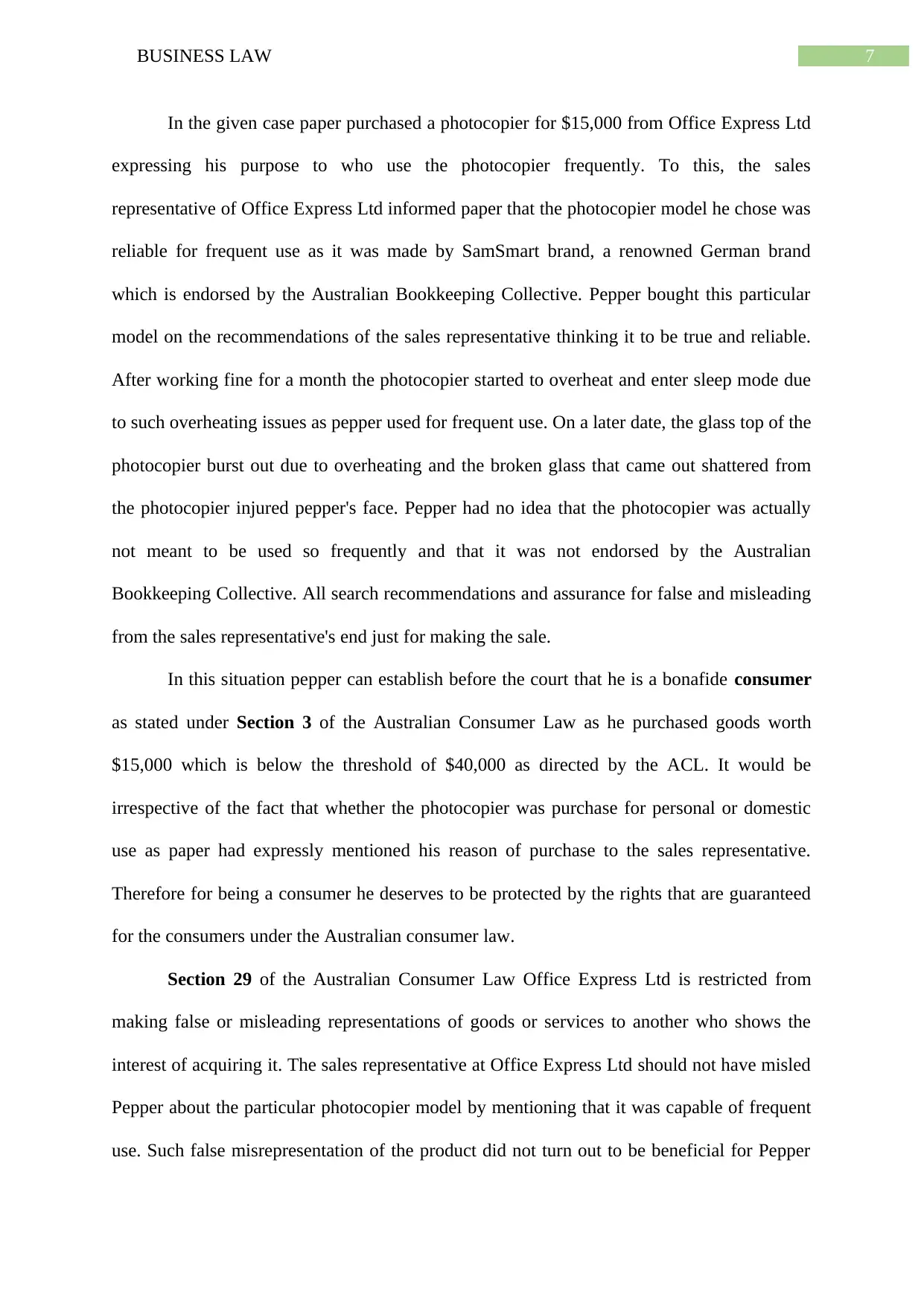
7BUSINESS LAW
In the given case paper purchased a photocopier for $15,000 from Office Express Ltd
expressing his purpose to who use the photocopier frequently. To this, the sales
representative of Office Express Ltd informed paper that the photocopier model he chose was
reliable for frequent use as it was made by SamSmart brand, a renowned German brand
which is endorsed by the Australian Bookkeeping Collective. Pepper bought this particular
model on the recommendations of the sales representative thinking it to be true and reliable.
After working fine for a month the photocopier started to overheat and enter sleep mode due
to such overheating issues as pepper used for frequent use. On a later date, the glass top of the
photocopier burst out due to overheating and the broken glass that came out shattered from
the photocopier injured pepper's face. Pepper had no idea that the photocopier was actually
not meant to be used so frequently and that it was not endorsed by the Australian
Bookkeeping Collective. All search recommendations and assurance for false and misleading
from the sales representative's end just for making the sale.
In this situation pepper can establish before the court that he is a bonafide consumer
as stated under Section 3 of the Australian Consumer Law as he purchased goods worth
$15,000 which is below the threshold of $40,000 as directed by the ACL. It would be
irrespective of the fact that whether the photocopier was purchase for personal or domestic
use as paper had expressly mentioned his reason of purchase to the sales representative.
Therefore for being a consumer he deserves to be protected by the rights that are guaranteed
for the consumers under the Australian consumer law.
Section 29 of the Australian Consumer Law Office Express Ltd is restricted from
making false or misleading representations of goods or services to another who shows the
interest of acquiring it. The sales representative at Office Express Ltd should not have misled
Pepper about the particular photocopier model by mentioning that it was capable of frequent
use. Such false misrepresentation of the product did not turn out to be beneficial for Pepper
In the given case paper purchased a photocopier for $15,000 from Office Express Ltd
expressing his purpose to who use the photocopier frequently. To this, the sales
representative of Office Express Ltd informed paper that the photocopier model he chose was
reliable for frequent use as it was made by SamSmart brand, a renowned German brand
which is endorsed by the Australian Bookkeeping Collective. Pepper bought this particular
model on the recommendations of the sales representative thinking it to be true and reliable.
After working fine for a month the photocopier started to overheat and enter sleep mode due
to such overheating issues as pepper used for frequent use. On a later date, the glass top of the
photocopier burst out due to overheating and the broken glass that came out shattered from
the photocopier injured pepper's face. Pepper had no idea that the photocopier was actually
not meant to be used so frequently and that it was not endorsed by the Australian
Bookkeeping Collective. All search recommendations and assurance for false and misleading
from the sales representative's end just for making the sale.
In this situation pepper can establish before the court that he is a bonafide consumer
as stated under Section 3 of the Australian Consumer Law as he purchased goods worth
$15,000 which is below the threshold of $40,000 as directed by the ACL. It would be
irrespective of the fact that whether the photocopier was purchase for personal or domestic
use as paper had expressly mentioned his reason of purchase to the sales representative.
Therefore for being a consumer he deserves to be protected by the rights that are guaranteed
for the consumers under the Australian consumer law.
Section 29 of the Australian Consumer Law Office Express Ltd is restricted from
making false or misleading representations of goods or services to another who shows the
interest of acquiring it. The sales representative at Office Express Ltd should not have misled
Pepper about the particular photocopier model by mentioning that it was capable of frequent
use. Such false misrepresentation of the product did not turn out to be beneficial for Pepper
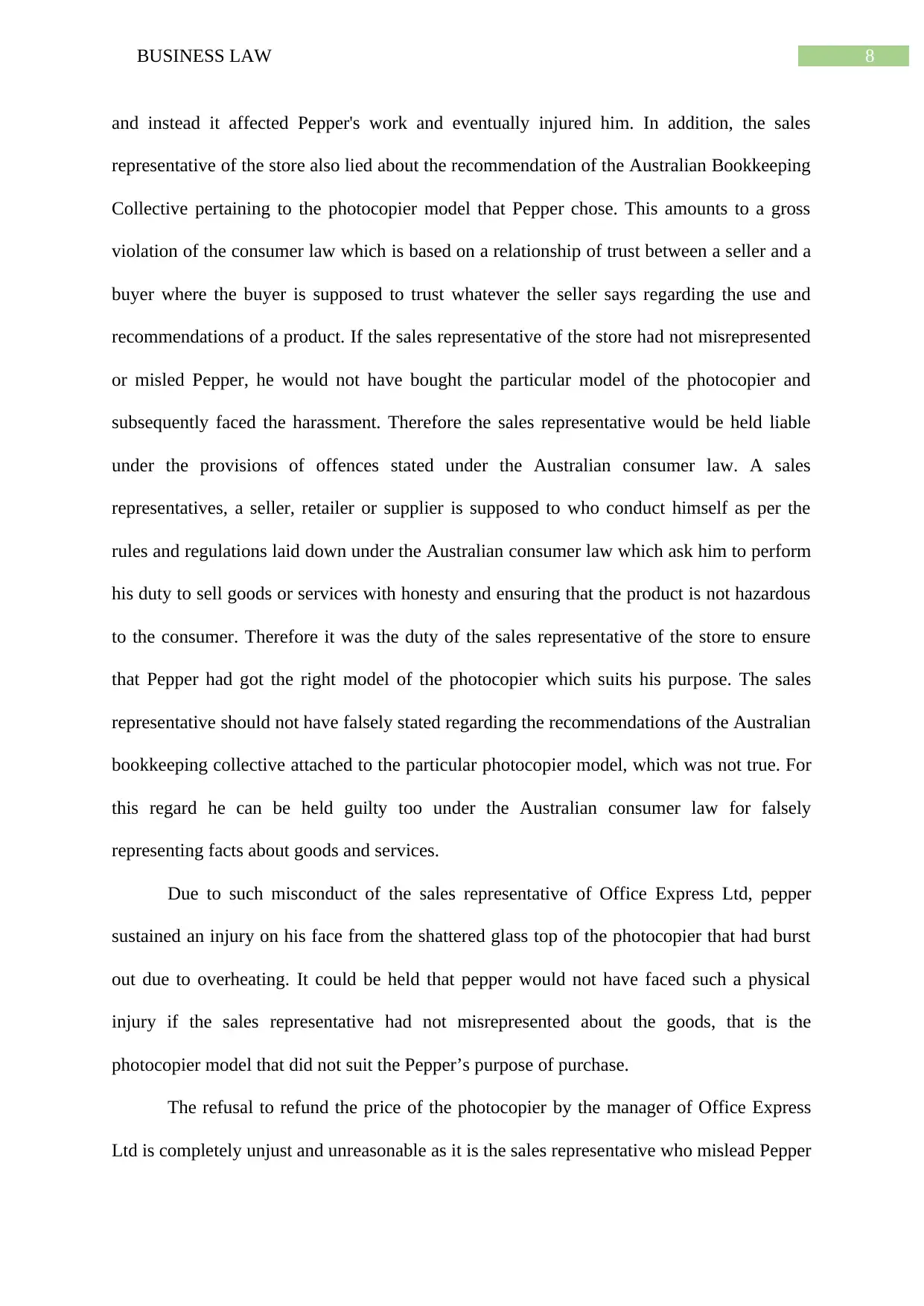
8BUSINESS LAW
and instead it affected Pepper's work and eventually injured him. In addition, the sales
representative of the store also lied about the recommendation of the Australian Bookkeeping
Collective pertaining to the photocopier model that Pepper chose. This amounts to a gross
violation of the consumer law which is based on a relationship of trust between a seller and a
buyer where the buyer is supposed to trust whatever the seller says regarding the use and
recommendations of a product. If the sales representative of the store had not misrepresented
or misled Pepper, he would not have bought the particular model of the photocopier and
subsequently faced the harassment. Therefore the sales representative would be held liable
under the provisions of offences stated under the Australian consumer law. A sales
representatives, a seller, retailer or supplier is supposed to who conduct himself as per the
rules and regulations laid down under the Australian consumer law which ask him to perform
his duty to sell goods or services with honesty and ensuring that the product is not hazardous
to the consumer. Therefore it was the duty of the sales representative of the store to ensure
that Pepper had got the right model of the photocopier which suits his purpose. The sales
representative should not have falsely stated regarding the recommendations of the Australian
bookkeeping collective attached to the particular photocopier model, which was not true. For
this regard he can be held guilty too under the Australian consumer law for falsely
representing facts about goods and services.
Due to such misconduct of the sales representative of Office Express Ltd, pepper
sustained an injury on his face from the shattered glass top of the photocopier that had burst
out due to overheating. It could be held that pepper would not have faced such a physical
injury if the sales representative had not misrepresented about the goods, that is the
photocopier model that did not suit the Pepper’s purpose of purchase.
The refusal to refund the price of the photocopier by the manager of Office Express
Ltd is completely unjust and unreasonable as it is the sales representative who mislead Pepper
and instead it affected Pepper's work and eventually injured him. In addition, the sales
representative of the store also lied about the recommendation of the Australian Bookkeeping
Collective pertaining to the photocopier model that Pepper chose. This amounts to a gross
violation of the consumer law which is based on a relationship of trust between a seller and a
buyer where the buyer is supposed to trust whatever the seller says regarding the use and
recommendations of a product. If the sales representative of the store had not misrepresented
or misled Pepper, he would not have bought the particular model of the photocopier and
subsequently faced the harassment. Therefore the sales representative would be held liable
under the provisions of offences stated under the Australian consumer law. A sales
representatives, a seller, retailer or supplier is supposed to who conduct himself as per the
rules and regulations laid down under the Australian consumer law which ask him to perform
his duty to sell goods or services with honesty and ensuring that the product is not hazardous
to the consumer. Therefore it was the duty of the sales representative of the store to ensure
that Pepper had got the right model of the photocopier which suits his purpose. The sales
representative should not have falsely stated regarding the recommendations of the Australian
bookkeeping collective attached to the particular photocopier model, which was not true. For
this regard he can be held guilty too under the Australian consumer law for falsely
representing facts about goods and services.
Due to such misconduct of the sales representative of Office Express Ltd, pepper
sustained an injury on his face from the shattered glass top of the photocopier that had burst
out due to overheating. It could be held that pepper would not have faced such a physical
injury if the sales representative had not misrepresented about the goods, that is the
photocopier model that did not suit the Pepper’s purpose of purchase.
The refusal to refund the price of the photocopier by the manager of Office Express
Ltd is completely unjust and unreasonable as it is the sales representative who mislead Pepper
⊘ This is a preview!⊘
Do you want full access?
Subscribe today to unlock all pages.

Trusted by 1+ million students worldwide
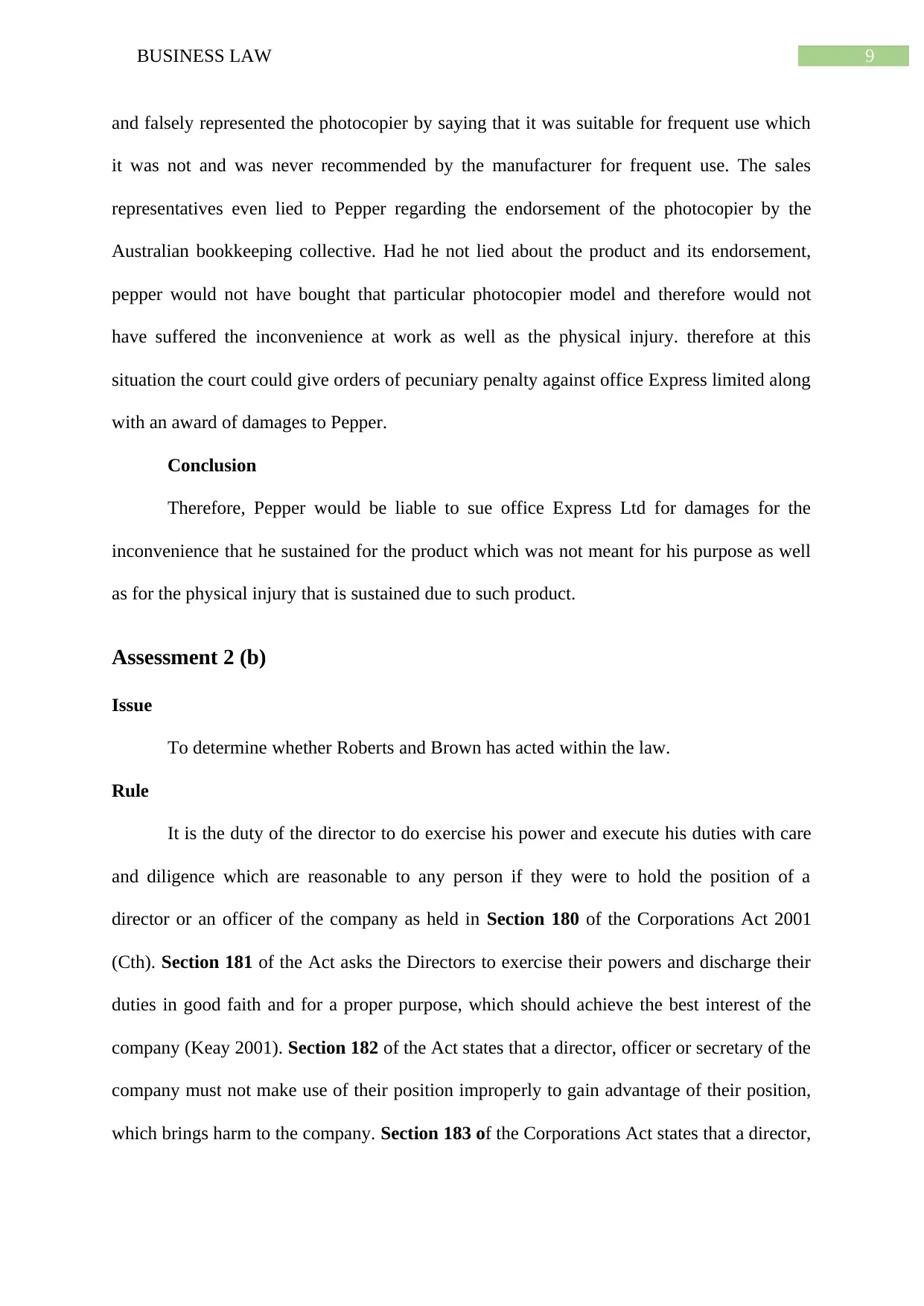
9BUSINESS LAW
and falsely represented the photocopier by saying that it was suitable for frequent use which
it was not and was never recommended by the manufacturer for frequent use. The sales
representatives even lied to Pepper regarding the endorsement of the photocopier by the
Australian bookkeeping collective. Had he not lied about the product and its endorsement,
pepper would not have bought that particular photocopier model and therefore would not
have suffered the inconvenience at work as well as the physical injury. therefore at this
situation the court could give orders of pecuniary penalty against office Express limited along
with an award of damages to Pepper.
Conclusion
Therefore, Pepper would be liable to sue office Express Ltd for damages for the
inconvenience that he sustained for the product which was not meant for his purpose as well
as for the physical injury that is sustained due to such product.
Assessment 2 (b)
Issue
To determine whether Roberts and Brown has acted within the law.
Rule
It is the duty of the director to do exercise his power and execute his duties with care
and diligence which are reasonable to any person if they were to hold the position of a
director or an officer of the company as held in Section 180 of the Corporations Act 2001
(Cth). Section 181 of the Act asks the Directors to exercise their powers and discharge their
duties in good faith and for a proper purpose, which should achieve the best interest of the
company (Keay 2001). Section 182 of the Act states that a director, officer or secretary of the
company must not make use of their position improperly to gain advantage of their position,
which brings harm to the company. Section 183 of the Corporations Act states that a director,
and falsely represented the photocopier by saying that it was suitable for frequent use which
it was not and was never recommended by the manufacturer for frequent use. The sales
representatives even lied to Pepper regarding the endorsement of the photocopier by the
Australian bookkeeping collective. Had he not lied about the product and its endorsement,
pepper would not have bought that particular photocopier model and therefore would not
have suffered the inconvenience at work as well as the physical injury. therefore at this
situation the court could give orders of pecuniary penalty against office Express limited along
with an award of damages to Pepper.
Conclusion
Therefore, Pepper would be liable to sue office Express Ltd for damages for the
inconvenience that he sustained for the product which was not meant for his purpose as well
as for the physical injury that is sustained due to such product.
Assessment 2 (b)
Issue
To determine whether Roberts and Brown has acted within the law.
Rule
It is the duty of the director to do exercise his power and execute his duties with care
and diligence which are reasonable to any person if they were to hold the position of a
director or an officer of the company as held in Section 180 of the Corporations Act 2001
(Cth). Section 181 of the Act asks the Directors to exercise their powers and discharge their
duties in good faith and for a proper purpose, which should achieve the best interest of the
company (Keay 2001). Section 182 of the Act states that a director, officer or secretary of the
company must not make use of their position improperly to gain advantage of their position,
which brings harm to the company. Section 183 of the Corporations Act states that a director,
Paraphrase This Document
Need a fresh take? Get an instant paraphrase of this document with our AI Paraphraser
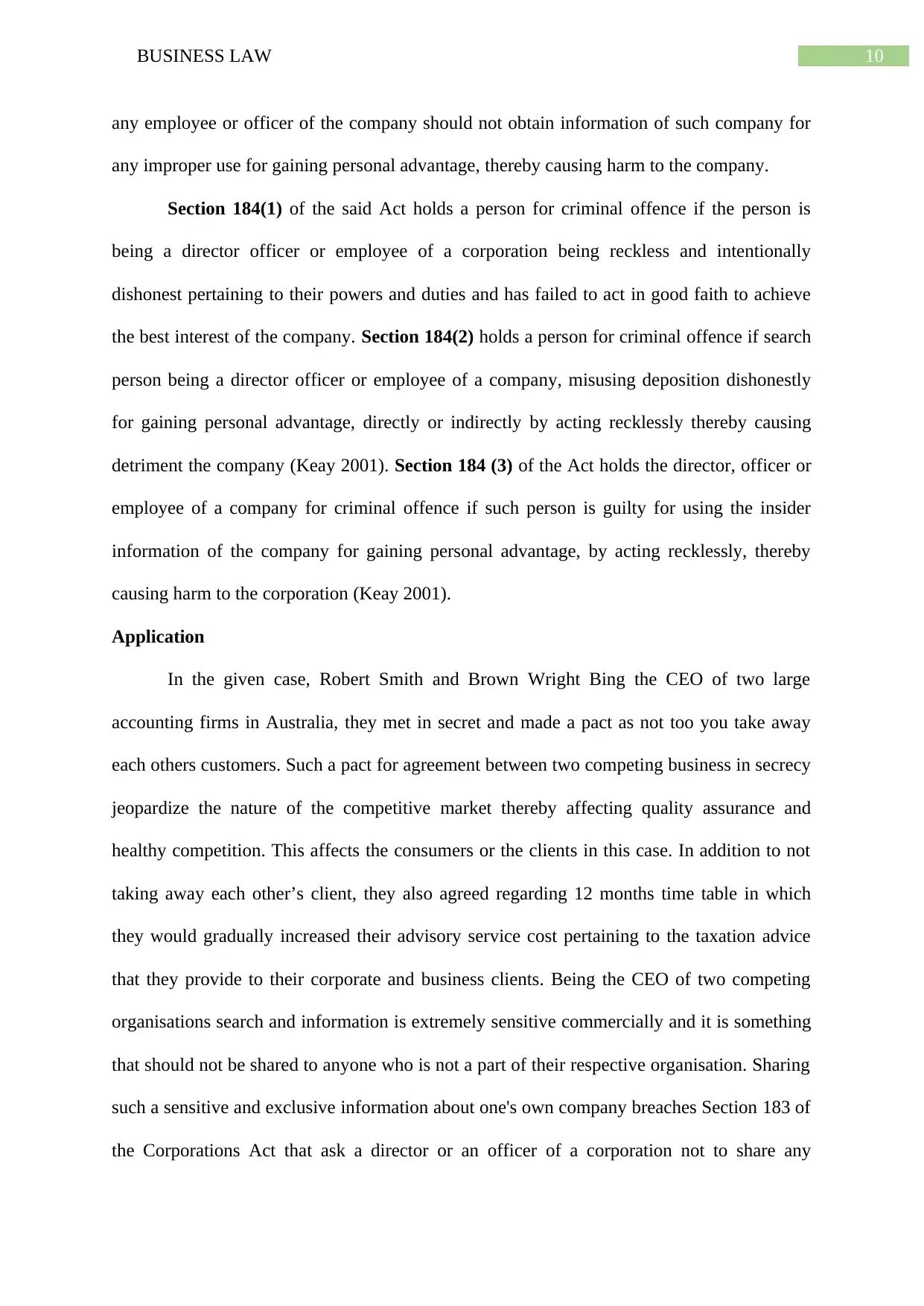
10BUSINESS LAW
any employee or officer of the company should not obtain information of such company for
any improper use for gaining personal advantage, thereby causing harm to the company.
Section 184(1) of the said Act holds a person for criminal offence if the person is
being a director officer or employee of a corporation being reckless and intentionally
dishonest pertaining to their powers and duties and has failed to act in good faith to achieve
the best interest of the company. Section 184(2) holds a person for criminal offence if search
person being a director officer or employee of a company, misusing deposition dishonestly
for gaining personal advantage, directly or indirectly by acting recklessly thereby causing
detriment the company (Keay 2001). Section 184 (3) of the Act holds the director, officer or
employee of a company for criminal offence if such person is guilty for using the insider
information of the company for gaining personal advantage, by acting recklessly, thereby
causing harm to the corporation (Keay 2001).
Application
In the given case, Robert Smith and Brown Wright Bing the CEO of two large
accounting firms in Australia, they met in secret and made a pact as not too you take away
each others customers. Such a pact for agreement between two competing business in secrecy
jeopardize the nature of the competitive market thereby affecting quality assurance and
healthy competition. This affects the consumers or the clients in this case. In addition to not
taking away each other’s client, they also agreed regarding 12 months time table in which
they would gradually increased their advisory service cost pertaining to the taxation advice
that they provide to their corporate and business clients. Being the CEO of two competing
organisations search and information is extremely sensitive commercially and it is something
that should not be shared to anyone who is not a part of their respective organisation. Sharing
such a sensitive and exclusive information about one's own company breaches Section 183 of
the Corporations Act that ask a director or an officer of a corporation not to share any
any employee or officer of the company should not obtain information of such company for
any improper use for gaining personal advantage, thereby causing harm to the company.
Section 184(1) of the said Act holds a person for criminal offence if the person is
being a director officer or employee of a corporation being reckless and intentionally
dishonest pertaining to their powers and duties and has failed to act in good faith to achieve
the best interest of the company. Section 184(2) holds a person for criminal offence if search
person being a director officer or employee of a company, misusing deposition dishonestly
for gaining personal advantage, directly or indirectly by acting recklessly thereby causing
detriment the company (Keay 2001). Section 184 (3) of the Act holds the director, officer or
employee of a company for criminal offence if such person is guilty for using the insider
information of the company for gaining personal advantage, by acting recklessly, thereby
causing harm to the corporation (Keay 2001).
Application
In the given case, Robert Smith and Brown Wright Bing the CEO of two large
accounting firms in Australia, they met in secret and made a pact as not too you take away
each others customers. Such a pact for agreement between two competing business in secrecy
jeopardize the nature of the competitive market thereby affecting quality assurance and
healthy competition. This affects the consumers or the clients in this case. In addition to not
taking away each other’s client, they also agreed regarding 12 months time table in which
they would gradually increased their advisory service cost pertaining to the taxation advice
that they provide to their corporate and business clients. Being the CEO of two competing
organisations search and information is extremely sensitive commercially and it is something
that should not be shared to anyone who is not a part of their respective organisation. Sharing
such a sensitive and exclusive information about one's own company breaches Section 183 of
the Corporations Act that ask a director or an officer of a corporation not to share any
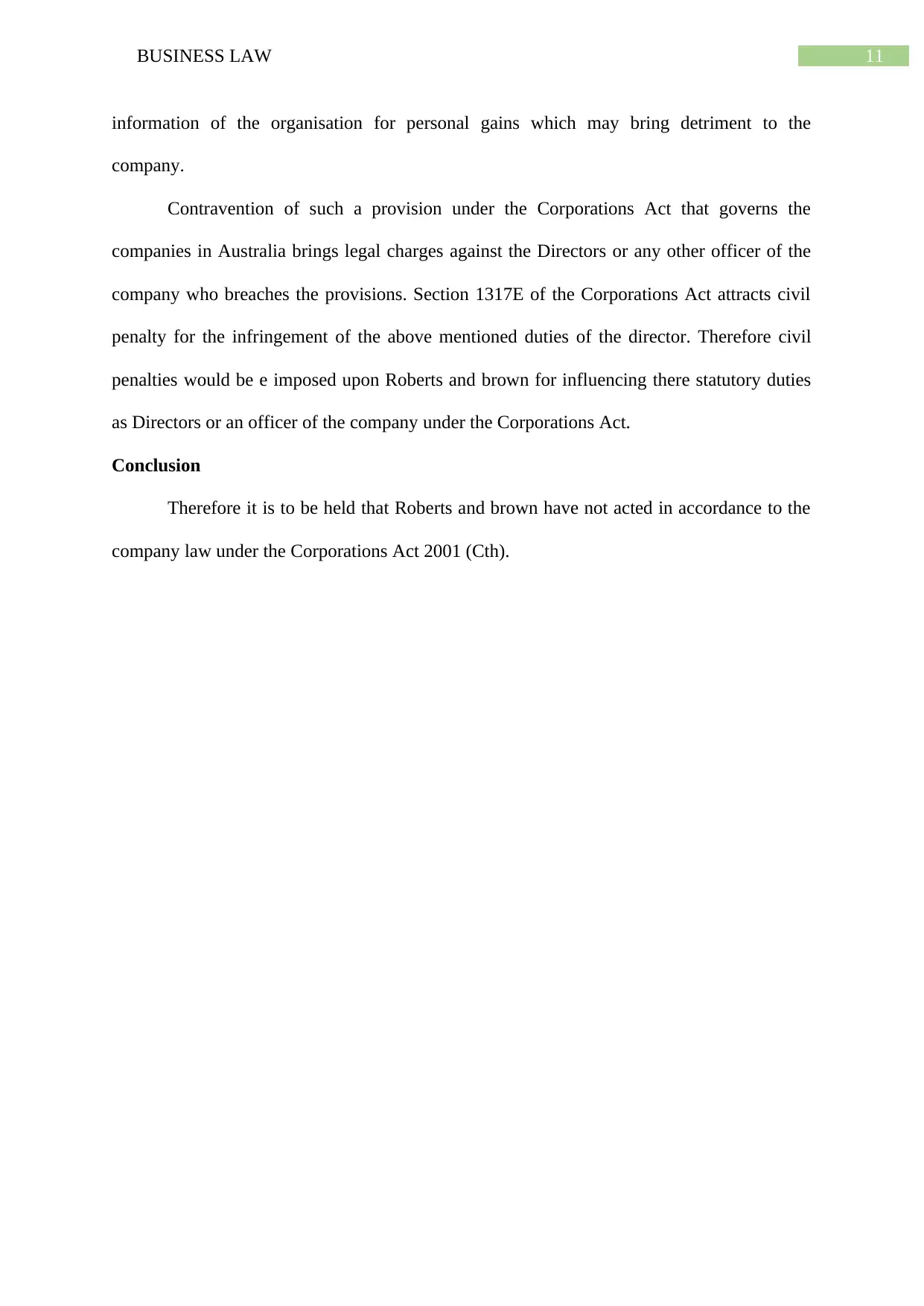
11BUSINESS LAW
information of the organisation for personal gains which may bring detriment to the
company.
Contravention of such a provision under the Corporations Act that governs the
companies in Australia brings legal charges against the Directors or any other officer of the
company who breaches the provisions. Section 1317E of the Corporations Act attracts civil
penalty for the infringement of the above mentioned duties of the director. Therefore civil
penalties would be e imposed upon Roberts and brown for influencing there statutory duties
as Directors or an officer of the company under the Corporations Act.
Conclusion
Therefore it is to be held that Roberts and brown have not acted in accordance to the
company law under the Corporations Act 2001 (Cth).
information of the organisation for personal gains which may bring detriment to the
company.
Contravention of such a provision under the Corporations Act that governs the
companies in Australia brings legal charges against the Directors or any other officer of the
company who breaches the provisions. Section 1317E of the Corporations Act attracts civil
penalty for the infringement of the above mentioned duties of the director. Therefore civil
penalties would be e imposed upon Roberts and brown for influencing there statutory duties
as Directors or an officer of the company under the Corporations Act.
Conclusion
Therefore it is to be held that Roberts and brown have not acted in accordance to the
company law under the Corporations Act 2001 (Cth).
⊘ This is a preview!⊘
Do you want full access?
Subscribe today to unlock all pages.

Trusted by 1+ million students worldwide
1 out of 13
Related Documents
Your All-in-One AI-Powered Toolkit for Academic Success.
+13062052269
info@desklib.com
Available 24*7 on WhatsApp / Email
![[object Object]](/_next/static/media/star-bottom.7253800d.svg)
Unlock your academic potential
Copyright © 2020–2026 A2Z Services. All Rights Reserved. Developed and managed by ZUCOL.





